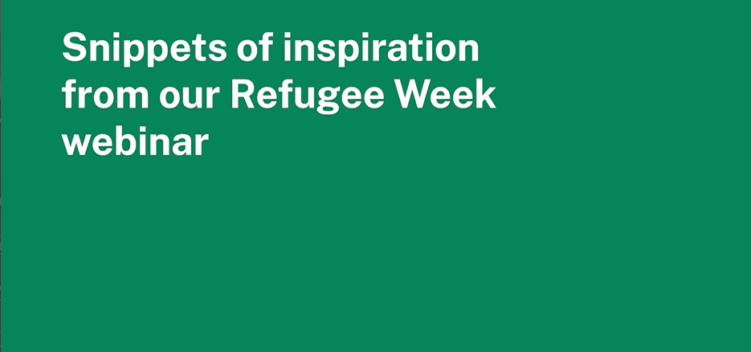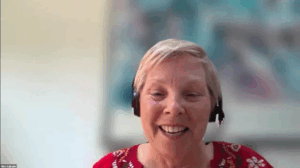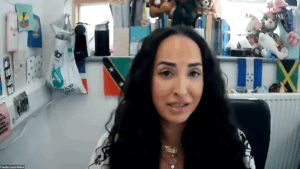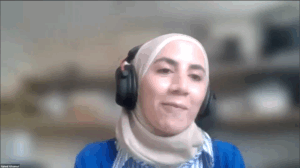How to support refugee families in and out of school
In this blog, we share some of the practical examples shared by practitioners in our Refugee Week webinar on how schools are helping to nurture communities in which refugee learners feel a real sense of belonging.
Keep reading to explore examples and recommendations of how schools and other settings can achieve meaningful social inclusion for refugee and asylum-seeking children and their families.

 Megan Greenwood
Megan Greenwood
School Coordinator, City of Sanctuary UK
For many families seeking sanctuary, schools are the first trusted institution they encounter and play a vital role in making refugee families feel welcome.
One inspiring example is the story of a school I worked with, which learned that a large number of Afghan families would soon be moving to their town. The school decided to offer places to any refugee child that would like it, and 30 new children were enrolled at the school in the middle of the term.
The headteacher informed the school community of the new arrivals, and immediately the school was inundated with offers of support from parents. Thanks to the generosity of the community, each new pupil received a rucksack and the equipment they needed for school. The school also put in place a ‘friendly face’ scheme which matched each refugee family with an existing family who had a child in the same class.
Three key learnings:
- Schools can lead openly with their values and their example
- There isn't a one size fits all approach when it comes to supporting refugee families. It is essential to build relationships and have regular conversations in order to understand the needs of those families who come with differing needs and challenges.
- Schools can advocate for ensuring that children feel safe both in the classroom and beyond the school gates.
 Nikki Ajibade
Nikki Ajibade
EAL Senior Lead, Warwickshire’s EMTAS Team
When a child joins a new school, a quality induction meeting with the parents or carers is essential. This is important as refugees are far from a homogeneous group: there's a such a high level of diversity that schools among refugees must strive to understand each child’s context and their potential.
Refugee children can come with skills, talents and knowledge that may go unrecognised and so schools must endeavour to play to these strengths. During my work with schools, I’ve come across a young chess champion from Turkey, a talented 14-year-old guitarist from Ukraine, and an 18-year-old taekwondo champion from Iraq.
Three recommended strategies:
- For unaccompanied asylum-seeking children who arrive alone, they often see themselves as adults and so they can find it challenging to be in a school setting where they are treated as children. Giving them responsibilities right from the start can ensure that they also feel a sense of belonging. This can involve handing out pencils in class or taking the register to the office.
- Set up bi-weekly drop-in for parents offering support for newly arrived EAL learners and families.
- Practise cultural reciprocity: being open to talking with refugee families, learning from them and the way they see things, even if it is different to our own perspective. Schools that have higher levels of parental engagement say that it is a key factor for any child's academic success.
 Claudia Lopez
Claudia Lopez
EAL Raising Achievement Coordinator, Saint Gabriel’s College, Lambeth
At St Gabriel's College, 27% of our students come from a Latin American background, which is the largest and fastest growing migrant group in Lambeth.
We have created a bespoke EAL curriculum that weaves together academic English, cultural heritage, and wellbeing. We get to know each student’s strengths and interests so that we can prepare them for success both in and outside the classroom and ensure that their culture is seen and celebrated.
Three examples of strategies and creative projects to keep new students engaged:
- Running free support groups and bilingual information sessions to help families navigate the UK system and to connect them with local resources. When schools and families work together, young people flourish.
- Using dance – in our case, Latin American dance – and storytelling workshops. When a child sees their culture reflected in their school space it sends a clear message that they belong. We’ve seen shy students become vibrant leaders simply because they were given the space to express themselves.
- Launching ‘Taller de Chicas’ – a space for Latin American girls from all year groups to talk, learn, and build their confidence. For many girls, this is the first time they've been in a space that fully reflects who they are in the UK and enables them to explore their identity and wellbeing.
 Nahed Alhamwi
Nahed Alhamwi
Specialist GCSE Arabic Teacher, Independent Community Leader, Syrian refugee
A few years ago, I noticed that many Syrian children who had moved to the UK were starting to lose their home language. It's not just a matter of forgetting some words or children not being able to communicate with their parents – it can also mean losing a part of their identity and who they are.
I created Noon Arabic Language Club to create a small community that helps young refugees feel prepared for their future in the UK, without forgetting about their home language.
At the Club we talk about our shared culture, tell jokes, or share songs in our own language. The goal is to help the children feel proud of themselves and to maintain their mother tongue, which is a useful tool for developing their English skills. I've witnessed many successes within our group: 25 children have passed their Arabic GCSE, and four are now at university.
However, I noticed a growing gap between mothers who had recently arrived in the UK and their children. While their children’s English improved at school, there was no such opportunity for mothers to practice the language in a non-judgemental space.
This is where ‘Bloom Group’ was born, providing a space for local women to come and express themselves. With members representing 16 countries, it’s more than just learning English – it’s also about learning how to adapt to life in the UK, signposting to the right organisations for advice, and celebrating our successes.
Three initiatives we have run at our clubs:
- For Refugee Week we held a celebration where individuals were able to tell their story and journey, what they have achieved, and what plans they have for the future.
- Our wish board project saw us collect the wishes of Bloom Group members and encourage them to consider how they can turn those wishes into reality.
- Remember that you don't necessarily need to set up a club – just an initiative or resource that can reach newly arrived families to make them feel they belong to the local community.
